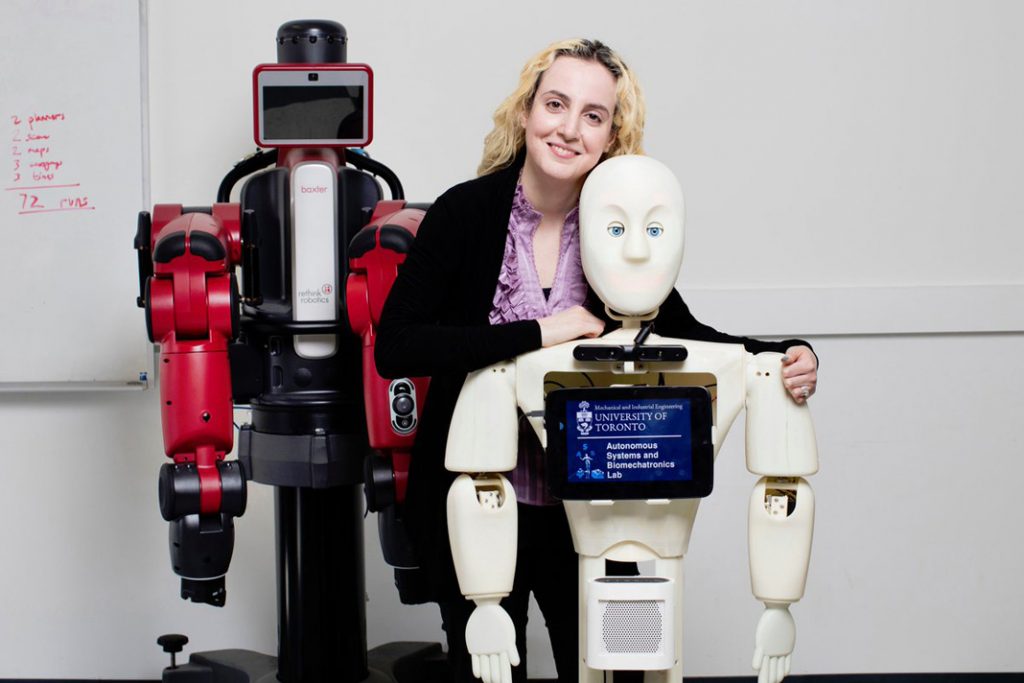
by Patchen Barss at U of T Institutional Strategic Initiatives.
Goldie Nejat envisions a world where growing old is improved by robots that care.
The Canada Research Chair in Robots for Society and professor of mechanical engineering in the University of Toronto’s Faculty of Applied Science & Engineering is an expert in assistive robotics – machines that provide care, interventions and even companionship for long-term care residents and people living with dementia and other cognitive and physical impairments.
The work is extraordinarily complex. In addition to engineering and artificial intelligence, creating robotic companions for an aging population often requires expertise in gerontology, cognitive neuroscience and medicine – even ethics.
Enter the Robotics Institute. Part of U of T’s Institutional Strategic Initiatives (ISI) program, the institute brings together top experts in different fields – from hardware design to public policy – to solve thorny, robotics-related problems in applications ranging from health care and transportation to manufacturing and logistics.
“Being at U of T, you have access to world-class researchers,” says Nejat. “Every time I want to find a collaborator with specific expertise and knowledge, it’s really easy.
“A lot of us [robotics engineers] work with surgeons, doctors, physiotherapists, occupational therapists – you name it.”
The Robotics Institute is just one of nearly two dozen institutional strategic initiatives launched by U of T to address complex, real-world challenges that cut across fields of expertise. Each initiative brings together a flexible, multidisciplinary team of researchers, students and partners from industry, government and the community to take on a “grand challenge.”
“The goal is to bring scientists, researchers and the broader research community together to achieve something that no one scientist or scientists from a single discipline could achieve on their own,” says Christine Allen, U of T’s associate vice-president and vice-provost, strategic initiatives.
“Whether they’re designing a new cancer treatment, developing more sustainable building materials, identifying better education systems for students with mental health issues, ISI participants are always exploring who can contribute – and who can benefit.
“Cross-divisional research and collaboration is paramount to addressing complex questions and making an urgently needed transformational impact.”
“A lot of us [robotics engineers] work with surgeons, doctors, physiotherapists, occupational therapists – you name it,” Nejat says.
The approach marks a departure from the traditional university model of loosely affiliated, but independent – and relatively siloed – faculties, departments, institutes and colleges. The problem, Allen says, is that modern societal challenges don’t map very well onto traditional university structures. Climate change, mental health, systemic racism, artificial intelligence and many other issues are so multifaceted and interconnected that they can only be addressed with diverse expertise, insights, and approaches.
The ISI approach, by contrast, seeks to take advantage of U of T’s size and breadth of expertise by creating research networks that cut across campuses and disciplines as varied as sociology and computer science – all in an effort to unlock answers to challenging problems and create new knowledge.
The programs aim to not only attract talent, but also grow it. Nejat, for one, says the openness of the ISI approach not only makes the research better, but it also helps ensure that the ideas that emerge have a positive impact in broader society.
“We’ve been very lucky to have a lot of interest in robotics from people who have never, ever dealt with the technology – people who come up with new research programs [related to robotics] that focus on the potential impact on society from a sociological or psychological point of view.
“It’s really interesting to see them helping us pave that way into the future.”
This is the first article in a series of stories about U of T’s Institutional Strategic Initiatives program – which seeks to make life-changing advancements in everything from infectious diseases to social justice – and the research community that’s driving it.
Read the full article and learn more about other Institutional Strategic Initiatives at U of T on the ISI news page.
